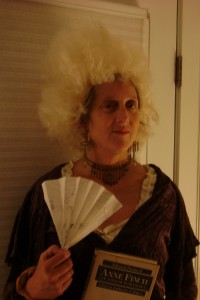Shades of the Eighteenth Century: Anne Finch, Quincy Troupe, and the Rock Me Ode
BY Annie Finch
 On Jetblue a few weeks ago, I happened on an outrageous 18th century kitsch costumed version of Falco's "Rock Me Amadeus." ... it reminded me that parts of the popular imagination have been heading back towards the 18th century for a while. And I also hunger for much of what went down at that time-the wit, the valuing of friendship, civilization, and humanistic values, the independence of thought, and the respect for constraint and control as sources of power and interest. After all, it was classicism that gave us REAL romanticism...before romanticism became the kneejerk party line and before aesthetic revolution became a generic brand of pablum.
On Jetblue a few weeks ago, I happened on an outrageous 18th century kitsch costumed version of Falco's "Rock Me Amadeus." ... it reminded me that parts of the popular imagination have been heading back towards the 18th century for a while. And I also hunger for much of what went down at that time-the wit, the valuing of friendship, civilization, and humanistic values, the independence of thought, and the respect for constraint and control as sources of power and interest. After all, it was classicism that gave us REAL romanticism...before romanticism became the kneejerk party line and before aesthetic revolution became a generic brand of pablum.
I haven't always felt this way. In the mid-80s, I had a love-hate relationship with the 18th century. I was first led to my interest in form because of a fierce jealousy for Alexander Pope, because he had heroic couplets to write in and I was only supposed to have free verse. Yet when it came down to it, my response was to avoid the whole period as much as possible. In fact, the only critique I received after my PhD orals was that I had an odd gap where the 18th century was concerned.
But that was a long time ago. Things are different now. Before a costume party last Halloween, for the first time I channeled my 18th century relative Anne Finch Countess of Winchilsea, the poet (yes, this post was partly inspired by Ange Mlinko's mention of her here on Harriet this week--more on that later). I had the costume all put together, a white Mexican blouse forced to conform to a velvet bodice with a couple dozen safety pins, when my husband pointed out that the whole point of such an outfit is. . . cleavage. Oh yeah. All the safety pins came off, cleavage wrapped into place, and most of the safety pins went on again. My 10-year-old folded a paper fan, and we found the perfect fright wig in the attic. A volume of Cousin Anne's poems pulled off the shelf, and the look was complete.
That evening, safety pins and a slipping wig notwithstanding, I tasted a sense of repartee and wit unlike any I've ever felt before. I had a blast, and came away with the distinct feeling that they REALLY knew how to live in the 18th century. (As an idle aside, I wondered how much of that feeling came from what I know about how OTHER people who dressed like that acted, and how much might be an actual physical result of ME dressing like that? It's the same question I have so often about certain meters and forms--more on that in a future post, maybe.)
Whatever the cause, I felt something that night that I hadn't been getting enough of lately, and a lot of it had to do not with formality per se, but with gratitude, with living in the moment, and with the powerful sense of living in the moment that certain conventions can bring. Wearing that outfit, I experienced the Japanese Tea Ceremony aspect of partying.
Ange writes about the feeling that she should write an ode in gratitude to her campus, like Anne Finch's and Ben Jonson's house poems. I say Go for it Ange! But it doesn't have to be in heroic couplets. In fact, I heard a contemporary house gratitude poem, by Quincy Troupe, performed as the climax of this month's SPLIT THIS ROCK FESTIVAL for POETRY OF PROVOCATION AND WITNESS. It was a magnificent performance, rocking, passionate, inspired, the real thing, and the poem itself was truly a "house poem" in the 18th century tradition, with glowing descriptions of a manor in Spain owned by a friend of his.
It got me thinking: there is nothing staid about gratitude. . . Here's to more poems of praise!
Love,
Countess Anne
Annie Finch is a poet, translator, cultural critic, and performance artist. She is the author of seven...
Read Full Biography

